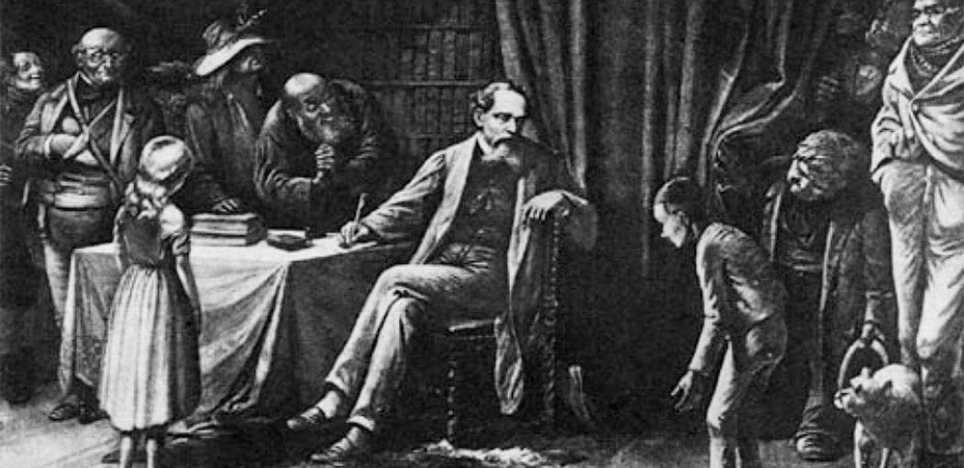Illustration credit: "Dickens and His Characters" by William Holbrook Beard (public domain).
Born on February 7, 1812, Charles Dickens was a British novelist, journalist, editor, illustrator, and social commentator. His father was a naval clerk who dreamed of being rich. After living beyond the family's means, he was sent to prison for debt when Charles was 12 years old. Forced to leave school and work for very low wages in a filthy warehouse, Charles felt betrayed and abandoned by the adults in his life.
Dickens eventually received more schooling, learned a form of shorthand in his spare time, and found his way into an early career as a journalist, editor, and illustrator. Having long been an avid reader and theatre-goer, he started writing stories in installments for journals, and his work climbed in popularity with all ages and classes of people.
Many literary scholars consider him the greatest English novelist. Dickens speaks across the generations with his masterpieces: The Pickwick Papers, Oliver Twist, David Copperfield, A Tale of Two Cities, and Great Expectations. They reveal his imaginative powers, his vital interest in the public affairs of Victorian England, his sympathy for the struggles and the suffering of the poor and the oppressed, his robust sense of humor, his keen observations on urban life, and his vibrant belief in life's fathomless vitality.
To Name This Day . . .
 Films
Films
We appreciate the creative and thematically bold movies based on Dickens' works. You might enjoy:
- Little Dorrit — a powerful work about greed, power, and love
- Nicholas Nickleby — a marvelously entertaining drama about a young man who learns to take care of himself by taking care of others
- Oliver Twist — about a protagonist who stands apart from others with his good manners
- Great Expectations — about an artist whose life is shaped by several extraordinary experiences;
- The Man Who Invented Christmas — about how Dickens came to write "A Christmas Carol."
 Quotes
Quotes
Does one of these quotes particularly spark your interest? If so, we suggest that you carry it with you — learning it by heart or writing it down —as a source of perspective today.
"There is a wisdom of the Head, and … there is a wisdom of the Heart."
-- in Hard Times
“Happiness is a gift and the trick is not to expect it, but to delight in it when it comes.”
― in Nicholas Nickleby
"Ask no questions, and you'll be told no lies."
— in Great Expectations
“That was a memorable day to me, for it made great changes in me. But it is the same with any life. Imagine one selected day struck out of it, and think how different its course would have been. Pause you who read this, and think for a moment of the long chain of iron or gold, of thorns or flowers, that would never have bound you, but for the formation of the first link on one memorable day.”
— in Great Expectations
“A wonderful fact to reflect upon, that every human creature is constituted to be that profound secret and mystery to every other.”
— in A Tale of Two Cities
“Some people are nobody's enemies but their own.”
— in Oliver Twist
“It is because I think so much of warm and sensitive hearts, that I would spare them from being wounded.”
— in Oliver Twist
“Whether I shall turn out to be the hero of my own life, or whether that station will be held by anybody else, these pages must show.”
― in David Copperfield
“No space of regret can make amends for one life's opportunity misused.”
― in A Christmas Carol
“I will honour Christmas in my heart, and try to keep it all the year. I will live in the Past, the Present, and the Future. The Spirits of all Three shall strive within me. I will not shut out the lessons that they teach!”
― in A Christmas Carol
 Spiritual Practice
Spiritual Practice
One of Dickens' most famous quotes comes from the beginning of A Tale of Two Cities, a historical novel set before and during the French Revolution:
“It was the best of times, it was the worst of times, it was the age of wisdom, it was the age of foolishness, it was the epoch of belief, it was the epoch of incredulity, it was the season of light, it was the season of darkness, it was the spring of hope, it was the winter of despair.”
Choose two to three recent newsworthy current events and — in your personal journal or with a friend — explore in what way they point to our times having this same polarized quality. Then ask what in you is capable of seeing a bird's eye view of the opposites and perhaps playing some role in reconciling them.
